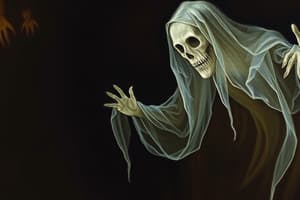Podcast
Questions and Answers
What is the main struggle encapsulated in Hamlet's famous soliloquy?
What is the main struggle encapsulated in Hamlet's famous soliloquy?
- Struggle with revenge and madness
- Struggle with indecisiveness and delay
- Struggle with existential questions about life and death
- Struggle with life and death, duty, and morality (correct)
Which character trait is Hamlet known for?
Which character trait is Hamlet known for?
- Compassionate and forgiving
- Impulsive and aggressive
- Thoughtful, introspective, and contemplative (correct)
- Cunning and manipulative
What is the main theme in Hamlet related to his contemplation about life and death?
What is the main theme in Hamlet related to his contemplation about life and death?
- Mortality (correct)
- Duty
- Revenge
- Madness
How does Hamlet's indecisiveness affect his plan to avenge his father's death?
How does Hamlet's indecisiveness affect his plan to avenge his father's death?
In what form does Hamlet express his thoughts and feelings directly to the audience?
In what form does Hamlet express his thoughts and feelings directly to the audience?
What is the significance of soliloquies in 'Hamlet'?
What is the significance of soliloquies in 'Hamlet'?
What themes are explored in 'Hamlet'?
What themes are explored in 'Hamlet'?
Who are involved in the power struggles in 'Hamlet'?
Who are involved in the power struggles in 'Hamlet'?
What do soliloquies in 'Hamlet' help the audience do?
What do soliloquies in 'Hamlet' help the audience do?
In what political context is 'Hamlet' set?
In what political context is 'Hamlet' set?
Study Notes
Hamlet
"To be, or not to be: that is the question." This famous soliloquy from William Shakespeare's play "Hamlet" encapsulates the protagonist's struggle with life and death, duty, and morality. The play, written in the late 16th century, is a complex exploration of human nature, revenge, and the nature of madness.
Hamlet's Character Analysis
Hamlet is a Danish prince who avenges his father's death by killing his uncle, Claudius, who has married Hamlet's mother, Gertrude. Hamlet is a thoughtful, introspective, and contemplative character who grapples with existential questions about life, death, and the nature of revenge. He is also known for his indecisiveness, which leads to a delay in his plan to avenge his father's death.
Themes in Hamlet
- Revenge: Hamlet seeks to avenge his father's death by killing Claudius, the usurper of his father's throne.
- Madness: Hamlet's contemplation about life and death, and his indecisiveness, drive his mother and others to believe he is mad.
- Duty: Hamlet feels duty-bound to avenge his father's death and restore his family's honor.
- Mortality: Hamlet reflects on the nature of death and the transience of life, questioning the value of human existence.
Significance of Soliloquies in Hamlet
Soliloquies are monologues in which Hamlet expresses his thoughts and feelings directly to the audience. They are significant in "Hamlet" because they allow the audience to understand Hamlet's inner thoughts and emotions, which are often hidden from the other characters in the play. Some notable soliloquies include:
- "To be, or not to be: that is the question."
- "Oh, that this too too solid flesh would melt."
- "How weary, stale, flat, and unprofitable seem to me all the uses of this world!"
These soliloquies provide insight into Hamlet's character and help the audience empathize with his struggles.
Political Context of Hamlet
"Hamlet" is set in the political context of the late 16th century, a time of political intrigue, power struggles, and the rise of national monarchies. The play explores themes of power, authority, and loyalty, as well as the consequences of betrayal and deceit. The political context of "Hamlet" is reflected in the power struggles between Hamlet and his uncle Claudius, as well as in the broader political landscape of Denmark.
Studying That Suits You
Use AI to generate personalized quizzes and flashcards to suit your learning preferences.
Description
Explore the depth of William Shakespeare's play 'Hamlet' through a character analysis of the Danish prince, themes like revenge, madness, duty, and mortality, as well as the significance of soliloquies in understanding Hamlet's inner struggles. Delve into the political context that shapes the power struggles and themes in this timeless classic.




